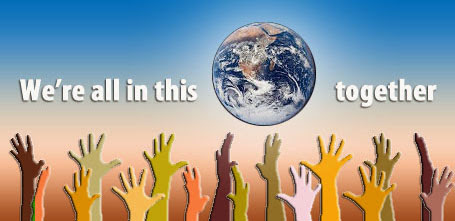In other words, we are products of our age and of a dominant ideological project - one that has too often taught us to see ourselves as little more than singular gratification - seeking units to maximize our narrow advantage. This project has also led our governments to stand by helplessly for more than two decades as the climate crisis morphed from a "grandchildren" problem to a banging-down-the-door problem." Naomi Klein, in The Nation, October 6, 2014
British economist, Tim Jackson writes in last week's Guardian about the conflict between economic growth and climate change. In The Dilemma of Growth: Prosperity vs. Economic Expansion, Jackson asks:
"Rethinking prosperity is a vital task because our prevailing vision of the good life – and the economics intended to deliver it – have both come badly unstuck. Financial markets are unstable; inequality is rising; and despite the 500,000 or so people who took to the streets before Tuesday’s UN Climate Summit in New York, tackling climate change still faces a “frustrating lack of progress”. If this were not enough, the proposition that more is always better has signally failed to deliver, particularly in the affluent west. But questioning these values is deemed to be the act of lunatics, idealists and revolutionaries."
Add me to that list.
But wait, there are signs of hope. From author Terry Tempest Williams blogging at the NYC Climate March, just a week ago -
"They just kept coming in waves, in torrents, a river of people convening on the streets of New York City in the march for climate justice. They just kept coming, hundreds of thousands of individuals, indigenous, black, white, brown, yellow, and red, a rainbow of colors winding through the canyons of Manhattan.
This movement of climate justice is no longer segregated, is no longer privileged, is no longer young or old, or the radical fringe moving toward the center. Instead, this movement resides in the core of a collective concern: Earth has a fever. There is no Planet B. What we witnessed on Sunday, September 21, was 400,000 individuals standing in the center of this crisis with love."
Maybe, there is just enough hope, that readers will throw off the shackles of hopelessness and take up the hard and long work of redirecting our future.
An election is only five weeks away. It's not too late or too early to work for a candidate or proposal in your community that can point us in a new direction. Not sure who? LOOK HERE
Now, not tomorrow.
